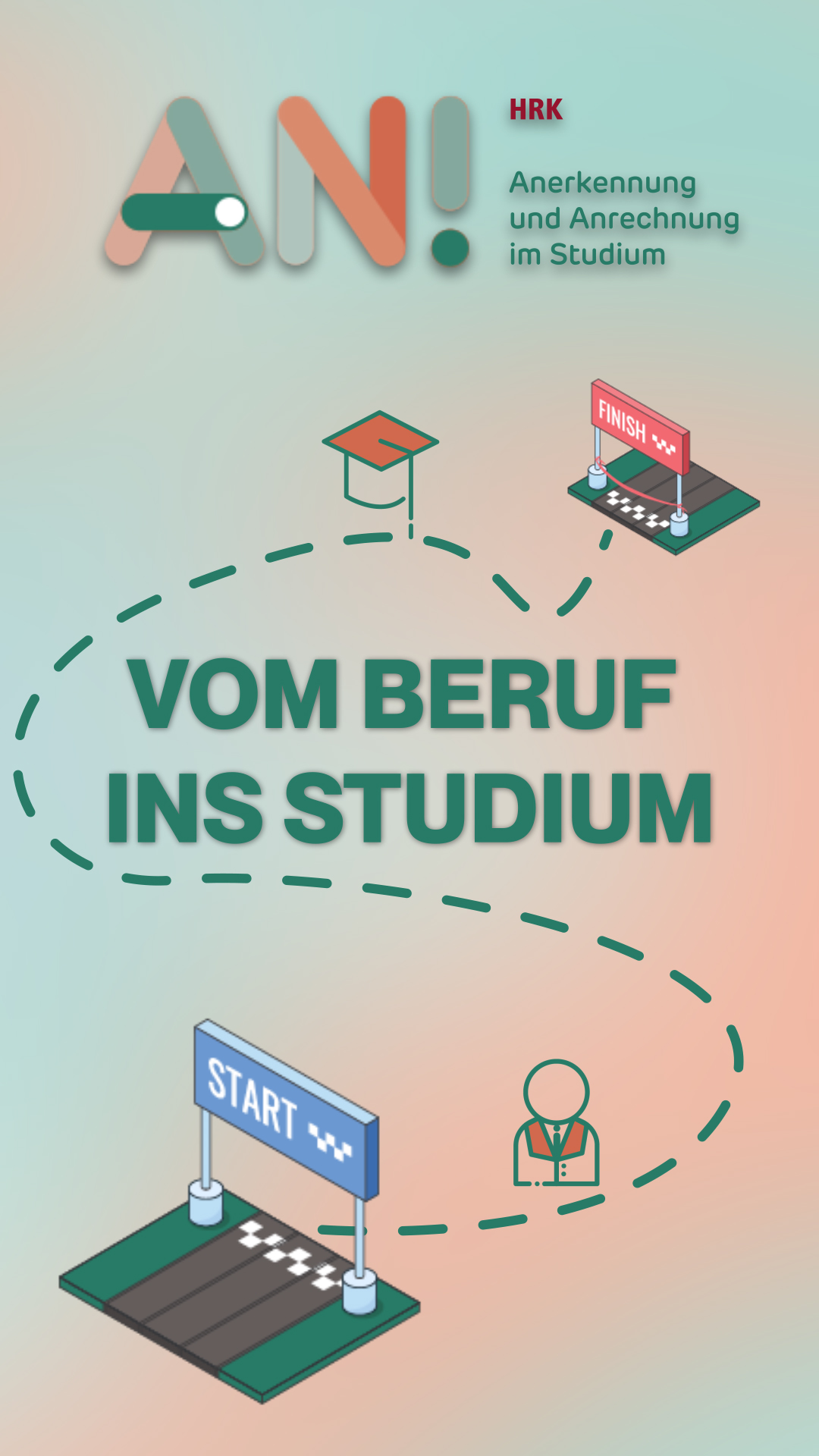- The information on this page focuses on recognition of qualifications on study programmes at universities. If you have obtained a professional qualification abroad and would like to have it recognised in order to work in Germany, you can find all the important information on the Federal Government’s information portal on the recognition of foreign professional qualifications, “Anerkennung in Deutschland”: https://www.anerkennung-in-deutschland.de/html/en/index.php.
Here’s how it works: 3 steps towards recognition of prior learning (RPL)
Who are your contact persons? Which tasks should you take care of and when? Our overview tells you – step by step. You can find more questions in our FAQ!
Step 1: How to find information in advance
- Good preparation is half the battle. If you’re hoping to have your skills from your professional life or other areas outside higher education recognised on your studies, you should do some background research. First of all, check to what extent your competences can be recognised as prior learning – as a rule, this should be an option at every university. The possibility of having competences acquired outside higher education recognised is based on legal regulations in the individual federal states. Possible recognition of prior learning depends on whether the competences you already have match your future study programme and its contents. However, the process doesn’t work the same way everywhere.
- Next, find out which recognition procedures are offered by the university of your choice: a distinction is made between procedures for the individual recognition of prior learning and procedures for lump-sum recognition of prior learning. Procedures for individual recognition of prior learning must be offered everywhere, in accordance with the requirements of the particular state higher education act. You can find out at your future university or through information portals (e.g. www.dabekom.de see below, in German only) whether lump-sum recognition of prior learning is also offered. Furthermore, you will receive specific information from your university for your application for recognition of prior learning. Be sure to take up the offer of the university’s student advisory service.
You can also find useful tips in the following resources: - www.hochschulkompass.de/en: The Higher Education Compass provides information on study programmes at German universities. You also have the option of using a search engine on the site to look for different programmes in Germany.
- www.dabekom.de: In addition to a wealth of information around the topic of recognition of prior learning, the database on recognition of vocational competences provides information on offers for individual and lump-sum recognition of vocationally acquired competences on study programmes.
Step 2: How to submit your application
- The next step is to submit your application. First of all, check what your university says on the subject. You can also find out more about this on your university’s website or from the relevant contact person (e.g. RPL officer). Which forms do you have to fill in and which documents do you have to submit? Generally speaking, your application will either be assessed individually, or lump-sum processing will be used. Depending on the competences you already have, both procedures can also be combined.
- Important: It is your task to prove that the competences you want to have recognised really correspond to those of the study programme. This “burden of proof” lies with you. You should therefore be able to provide good evidence of the competences, for example by comparing the descriptions of your vocational training (e.g. training framework plan, training regulations or framework curriculum) with the module descriptions of your study programme. As the structure of education systems in different countries can vary greatly, comparing your foreign professional qualification with the content of your study programme in Germany may pose challenges. It is likely that you will need to submit translations of your certificates and other relevant documents.
- During the application phase, the university may approach you and ask for more detailed information – you need to do your best to cooperate (see obligation of cooperation).
- In an individual procedure, your acquired competences will be assessed based on your particular case. The main purpose of the assessment is to see whether the content and level of your competences acquired outside higher education and the study module that is to be replaced are equivalent. To prove this, you often need to create a portfolio. The portfolio documents your acquired competences and experiences from your vocational training, your working life or other qualifications, including supporting documents, and assigns them to the learning objectives of the respective module.
- As a rule, individual recognition of prior learning takes place after matriculation (enrolment) in the study programme. It is advisable to apply for recognition of prior learning right at the start of your studies so that you can structure your study plan sensibly (e.g. to have more time for a stay abroad). However, it’s still possible to submit the application further on in your study programme if you have not yet completed a module with the final examination.
- With a lump-sum procedure, either a partnership exists between the university and a training institution or individual procedures with the same non-academic competences have already occurred several times, meaning that your university can decide lump-sum on your application. The university has assessed in advance to what extent the learning outcomes of a training programme are equivalent to the content of the study programme. In the process, it was determined which modules or how many credit points from the training can be recognised on the study programme.
- If this is offered, you can submit your application for lump-sum recognition of your training to your university without much extra effort – simply submit the proof of qualification and the application. With a lump-sum procedure, before you start your study programme you already have the guarantee that certain competences will be recognised – so you know in advance how many modules of your study programme can be replaced by your prior learning experience. In general, it is possible to substitute at most 50 percent of the study programme with competences acquired outside higher education.
Step 3: How the assessment and decision-making work
- Almost there! Are the learning outcomes from your training (or similar) equivalent to those of the study programme? This will become clear during the content-related assessment. In the final step, your application is assessed and a decision is made about which or how many of your competences will be recognised. Please be patient – it can take up to three months from the submission of the documents to the result of the assessment.
- If the documents submitted are not sufficient for the recognition assessment, you may have to have an interview with a person responsible for the subject or explain your competences in writing (see competence assessment procedure). When the application has been assessed formally and the competences’ equivalence been examined, you will receive a letter with the result of your application for RPL.
- Your application may be rejected if the assessment proves that there is no equivalence between the qualification you want to have recognised as prior learning and the study module that is to be replaced.
- If you do not agree with the result of the application assessment, e.g. because your application was rejected, as a rule, you have the option of lodging an objection within one month. (see options for objecting).
- The application assessment process works similarly at all universities, but there may be differences in the process, for example with regard to deadlines.
- The fact that your competences acquired outside higher education have been recognised for your study programme will usually be noted in your transcript of records.
Steps in a recognition of prior learning procedure

 Checklist
Checklist
Step by step to achieving recognition of your competences acquired outside higher education – summarised here in our compact checklist.

What’s next?
- In principle, this information applies to all German universities. However, there are differences between the federal states, and the universities themselves can determine how the procedures are structured, which can lead to differences. So please contact your university that you would like your competences recognised by.
Want to know more?
- The Higher Education Compass provides information on the study programmes offered at German universities. You also have the option of using a search engine on the site to look for different study programmes in Germany. hochschulkompass.de/en
- The Federal Government’s portal for skilled workers from abroad – www.make-it-in-germany.com/en/ – provides important information on study and training in Germany, and more.
- If you have obtained a professional qualification abroad and would like to have it recognised in order to work in Germany, you can find all the important information on the Federal Government’s information portal on the recognition of foreign professional qualifications,“Anerkennung in Deutschland”: www.anerkennung-in-deutschland.de/html/en/index.php.
- If you come from abroad, you can go to myguide.de/en/ to find out which study programmes offered at German universities are right for you and test your admission requirements for studying in Germany.
- The information and application portal www.hochschulstart.de (in German only) provides information on all aspects of applying to study at German universities and coordinates certain procedures (e.g. the central allocation procedure for human medicine, veterinary medicine, dentistry and pharmacy).
- The online study guide for all those with vocational qualifications, www.studieren-ohne-abitur.de (in German only), provides information and reports on students’ experiences with accessing study programmes without the German university entrance qualification “Abitur”.
- The official study guide for Germany from the Federal Employment Agency and hochschulstart.de, studienwahl.de/en, lets you explore all fields of study and get a lot of further information on applying, financial questions or sources of guidance.
- In addition to a wealth of information on the subject of recognition of prior learning, the database on recognition of vocational competences provides information on possibilities of individual and lump-sum recognition of prior learning for vocationally acquired competences for study programmes. dabekom.de (in German only).
From work to studies – all the important questions and answers
“How does it work again?” Our FAQ provide concise, straightforward answers to important questions about recognition of prior learning for your competences from training, work and more.
The lexicon – everything you need to know about academic recognition and recognition of prior learning.
Unfortunately, a few technical terms can’t be avoided. But don’t worry, our lexicon gives you simple and comprehensive definitions and explanations in alphabetical order – from accreditation and options for objecting to state higher education laws.



